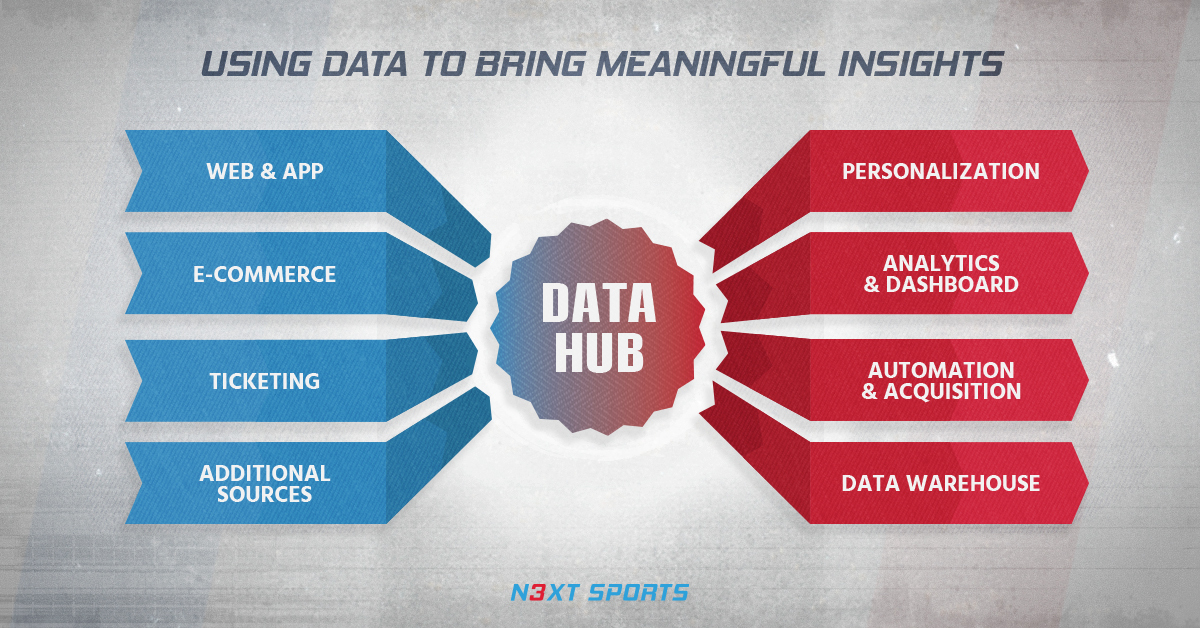Insights from Mounir Zok

Data ownership holds several benefits for a sports business, notably its ability to dictate how information is managed and flows internally. By taking ownership of how customer data is measured, for example, a sports organization can identify the fan behaviors that offer value to the business and adjust their customer interactions to increase customer loyalty and customer spend.
In order to do this successfully, an organization must be willing to build-in software that allows for the collection, interpretation, and management of its own data points, across its entire digital ecosystem. No rights holder is alike, which means that how an organization goes about developing its own data warehouse depends on the state of its existing internal infrastructure and understanding how digitalization serves its business objectives. However, many organizations still don’t take this approach.
According to The Business of Sport, research conducted by Bas Schnater and Geoff WIlson in 2021 highlighted that close to a third (32 percent) of organizations do not review their data objectives and only 10 percent communicate them across their entire company.
By taking ownership of the way data is ingested and corroborated within the company, executives grant themselves a front-row seat to the evolution of their business. In turn, they are able to identify new revenue opportunities and adapt their processes accordingly.
This might include:
- Deciding how and when the organization engages with individual fans directly, and segments highly engaging content
- The development and monetization of their own digital assets, such as mobile apps and high-performance technology
- The adoption of artificial intelligence and machine learning technologies to enhance operational efficiency
Whereas traditionally the collection and management of a rights holder’s data has been licensed to a third-party data analysis provider, there are downsides to this approach. For many organizations, the data partnership has proven to be an effective way to build out the entity’s customer relationship management (CRM) capability.
However, by outsourcing this area of the business, the rights holder is unable to take full ownership of its data infrastructure and is reliant upon a partner organization to determine the integrity of its data and how its data is distributed. As a consequence, the rights holder does not receive the full benefits that data ownership would otherwise offer the organization, narrowing its scope for innovation and its room to evolve.
SPORTS ENTITIES SEEKING DATA INDEPENDENCE
As the sports technology market continues to take significant strides, data ownership is becoming more popular among rights holders. Speaking on Deltatre’s In The Know webinar series, Roger Muller, Chief Media and Marketing Officer at the Swiss Football League (SFL), said that the “first logical step” for the property to develop its own ideas and innovate was “for us to get more control and to be able to do what we wanted to do''.
“In my experience […] the third-party data providers were the ones to call the shots, and they told you what you are allowed to do […] with data,” he expanded. “So sooner or later, you end up in a situation where you are not satisfied anymore with what they give you. We looked for new solutions and that meant that we started to build resources internally in order to gain some independence and control of content.”
In pursuit of data ownership, developing a data warehouse that satisfies the sports organization’s vision, rights holders must first seek to understand their own digital readiness, including the company’s overall technological maturity, before deciding on their next steps. This can be achieved by establishing a carefully thought-out partnership with a technology expert which owns the capabilities and know-how for curating a connected digital ecosystem and one that sits around the rights holder’s very own data repository.
For example, Real Madrid recently partnered with US technology company Cisco in a wide-ranging collaboration that will see the creation of the LaLiga champions’ very own data center at their Santiago Bernabéu home stadium. The project aims to enhance connectivity between fans and the club’s content.
This identifies how technology companies are supporting the consolidation of data sources inside one of sport’s elite clubs. For sports clubs beginning their digital transformation journey, understanding the value of their data and how to position its data offering can be a challenge when seeking support from an external technology vendor.
Speaking on the subject of tech partnerships, Mounir Zok, N3XT Sports Chief Executive, said: “Our clients depend on us to guide them through the development of innovation, investment, data and digital strategies, while also supporting the implementation.
“For example, how does an international federation prepare to negotiate its data rights with a new technology partner that wants to provide cloud services? We’re here to equip stakeholders in the sports industry with tools and skills to make the most of this shift.”
DATA LEARNINGS INFORM LONG-TERM ENGAGEMENT
While there is a strong business case for sports entities to explore data ownership, developing the infrastructure to support this enterprise isn’t straightforward. It requires a thorough assessment of the property’s existing digital capabilities, including the role data already plays within the organization and how it’s shared between departments.
Only then can they begin developing a digital transformation roadmap that supports the integration of data-focused technologies. And once this has been delivered, the job of collecting and analyzing data doesn’t stop there. Just as digitalization enables sports properties to alter the way it delivers content to fans, based on their interests, customer data evolves, too, and is an ongoing learning experience for the data owner.
For example, Volleyball World partnered with US-based software company, Twilio Segment, to support the creation of the federation’s “integrated and future-looking” customer data strategy. According to Motasem El Bawab, Volleyball World’s Head of Digital and a digital advisor to N3XT Sports, the focus of the project “isn’t just about collecting data in one place” but how to leverage data to “transform the customer journey and drive business value” and to build sustainable, long-lasting relationships with Volleyball World’s 800 million fans.

By building a “centralized, single source of truth” for the federation’s event and user-behavior data, Volleyball World has recorded significant returns on its investment (ROI), including, in 2021, a 400 percent increase in revenue from one key event via its dedicated over-the-top (OTT) service; a reduction in cost per acquisition (CPA) by more than 50 percent; and a 531 percent increase in ROI across its entire advertising spend.
Therefore, while building a data warehouse is a long-term commitment and takes time and resources to implement successfully, in order to see results, sports federations must take the time to understand how data-driven decisions support the customer journey, including, for example, the impact competition cycles have on digital engagement, ticket and merchandise sales, as well as the generation of media rights and advertising revenues.
To attain this level of knowledge, the collection and analysis of data across all departments is paramount; from an administrative point of view and understanding how the organization operates, to the behavior of its customers, during and between events, via the property’s digital platforms. This will help to highlight, in tandem, the technologies that enhance the performance of the business and the direct-to-consumer (D2C) experience.
WHAT’S N3XT?
Whether you are looking for ways to communicate more effectively with fans, seeking to distribute high-performance data generated from athletic competition, or simply want to improve the organization’s operational workflows, by taking ownership of data, the rights holder learns more about the areas where it is succeeding, what’s stalling growth, and use that information to find solutions for improving their internal processes.
Remember: knowledge seeds creation – therefore, a rights holder’s ability to innovate in the future will depend on how well they understand their digital ecosystem. This includes how the organization can engage customers, sponsors, and stakeholders more effectively, as well as the opportunity to reduce operational costs by investigating how the organization communicates information internally and how its workforce accesses data.
As with digitalization, data ownership is no longer a “nice-to-have”. For sports properties to continue to be competitive – on and off the field – how they capture and then interpret their own data is key to their success. This starts through conversations with an expert which can develop a roadmap that puts data management at the heart of the organization’s digital transformation and offers the business a clear vision for the future.
As such, N3XT Sports continues to help sports organizations develop their own bespoke innovation roadmaps and implement technologies that serve their data needs. To find out more about how we can support your organization’s digital transformation, please fill out the form below and we’ll be in touch.



